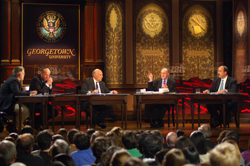For their first trip to the United States, the Doha Debates, a weekly debating program that airs on BBC World News, came to Georgetown to discuss whether “it’s time for the U.S. administration to get tough on Israel.” The motion was ultimately approved, with 63 percent of the audience voting in its favor.

From Doha to D.C.: (From left) Michael Sheuer, Avraham Burg, Moderator Tim Sebastian, Alan Dershowitz, and Dore Gold
Michael Sheuer, the former Head of the CIA’s Bin Laden Unit, began the debate by arguing that American involvement in Israel is contrary to national interest and a “5th column” of pro-Israeli, un-patriotic Americans has controlled the U.S. foreign policy. His partner, former Speaker of the Israeli Knesset Avraham Burg, took a more moderate position. He maintained that America was like a parent that needed to discipline its child, Israel, for its own good.
Their opponents, former Israeli Ambassador Dore Gold and Harvard Law professor Alan Dershowitz argued that the possibility of a nuclear Iran is a bigger problem for the United States than any concerns about Israel. Dershowitz also argued that it would be unwise for the United States to get tough on Israel while simultaneously easing relations with Iran.
Sheuer’s statements about the “5th column” led to heated exchanges with Dershowitz, culminating in Dershowitz calling Sheuer a “bigot” and saying his statements were reminiscent of conspiracy theories like the Protocols of Zion.
Although the motion passed by a wide margin, some students in the audience thought it was less a reflection of the strength of the debaters and more a testament to the audience’s predetermined position on the issue.
“I found it unfortunate there wasn’t the inclusion of any Palestinian or Middle Eastern voice,” Omar Shakir, a member of Georgetown Students for Justice in Palestine said. “I think the majority of the audience, let’s be honest, came with pretty set opinions … [The motion passed] despite the debaters, not because of them.”




